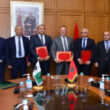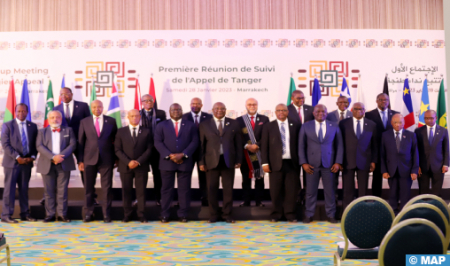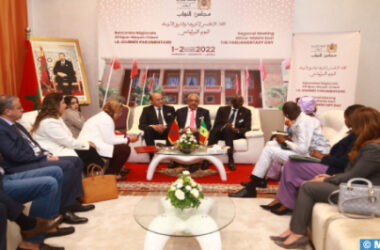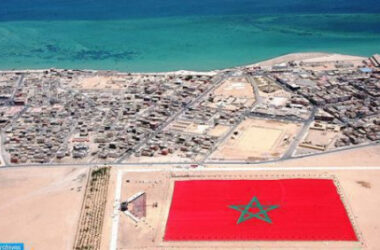During this meeting, they reiterated their full commitment to work together and in coordination for the expulsion of this non-state entity from the African Union (AU).
These former African Prime Ministers and Ministers also considered that this expulsion, legitimate from a legal point of view, should not be considered as an unattainable goal because it is part of a favorable continental and international dynamic, where realism and pragmatism prevail, and because it represents an essential prerequisite for the return of the impartiality and credibility of the Pan-African Organization on the Moroccan Sahara issue.
Based on the various recommendations of the Pan-African Reflection Campaign on the challenges facing the AU with regard to the Moroccan Sahara issue, which were discussed at five sub-regional seminars held between May and October 2021 in Nouakchott, Dakar, Accra, Dar es Salaam and Dakar, Accra, Dar Es-Salaam and Kinshasa, the signatories of the “Solemn Appeal for the expulsion of the +so-called sadr+ from the African Union”, discussed a draft “White Paper” that they adopted unanimously, after having made their valuable contributions.
This “White Paper”, entitled “The African Union and the Moroccan Sahara issue, Final Deliverable of a Deep and Inclusive Pan-African Reflection”, is the outcome of the Pan-African Campaign and the faithful reflection of the debates held during the various meetings and seminars.
This “White Paper” develops an irrefutable factual and historical argument. It is a legal and political reference document, which materializes a vision of a united Africa and a renewed Pan-Africanism, far from the ideologies of another time.
It is also a plea that the so-called “sadr”, imposed on the sole Organization of the African Union, is not a state entity since it has none of the qualifying attributes of a “state”.
In addition, the document adds, the so-called “sadr”, based in Algerian territory, is subject to a higher sovereignty, that of Algeria.
Moreover, it is a non-state entity with no international legal responsibility and its admission to the OAU is a legal coup, in blatant violation of its Charter.
The admission of the “sadr” to the OAU took place in a particular context, at a time when the continent was in the grip of various ideological currents that are now obsolete.
The “White Paper” also notes that by admitting the so-called “sadr”, the OAU has prejudged, in all partiality, the outcome of a process, described as a “regional solution”, just as the presence of the so-called “sadr” within the OAU and then the AU, has distanced the organization from the treatment of the Sahara issue.
Furthermore, the document notes that Decision 693 taken by the AU at the Nouakchott Summit in July 2018, attests to the exclusivity of the UN process in the search for a “just, lasting and mutually acceptable political solution”, noting that the so-called “sadr” » without effectiveness due to its non-state character, does not bring any added value to the AU and is a source of division rather than unity.
The “White Paper” admits that the presence within the AU of the so-called “sadr”, a non-state emanation of an armed separatist group, illustrates the institutional vulnerability of the Organization and represents an undeniable brake on regional and continental economic integration.
During this First Follow-up Meeting, three new African countries signed the “Solemn Call for the expulsion of the so-called sadr from the African Union”, known as the “Tangier Appeal”. They are Lesotho, Madagascar and Gambia.
The “Tangier Appeal” had been signed on November 04, 2022, by former prime ministers and African ministers, including the following list:
1- Augusto António Artur da Silva, former Prime Minister of Guinea-Bissau.
2- Dileita Mohamed Dileita, former Prime Minister of Djibouti.
3- Martin Ziguélé, former Prime Minister of the Central African Republic.
4- Mohamed Abdirizak Mohamud, former Foreign Minister of Somalia.
5- Alpha Barry, former Foreign Minister of Burkina Faso.
6- Lutfo Dlamini, former Foreign Minister of Eswatini.
7- Jean-Marie Ehouzou, former Minister of Foreign Affairs and Cooperation of Benin.
8- Fahmi Saïd Ibrahim El Maceli, former Foreign Minister of the Comoros.
9- Gbehzohngar Milton Findley, former Foreign Minister of Liberia.
10- Régis Immongault Tatangani, former Foreign Minister of Gabon.
11- Francis Kasaila, former Foreign Minister of Malawi.
12- Luis Felipe Lopes Tavares, former Foreign Minister of Cape Verde
13- Mankeur Ndiaye, former Foreign Minister of Senegal
14- Léonard She Okitundu Lundula, former Minister of Foreign Affairs and Regional Integration of the Democratic Republic of Congo
15- Mamadi Touré, former Foreign Minister of Guinea.
16- Rafael Tuju, former Foreign Minister of Kenya.
Here follows the list of the new signatories of the “Tangier Appeal”:
17- Lesego Makgothi, former Foreign Minister Affairs of the Kingdom of Lesotho.
18- Lamine Kaba Badjo, former Foreign Minister of the Republic of Gambia.
19- Patrick Rajoelina, former Foreign Minister of the Republic of Madagascar.










